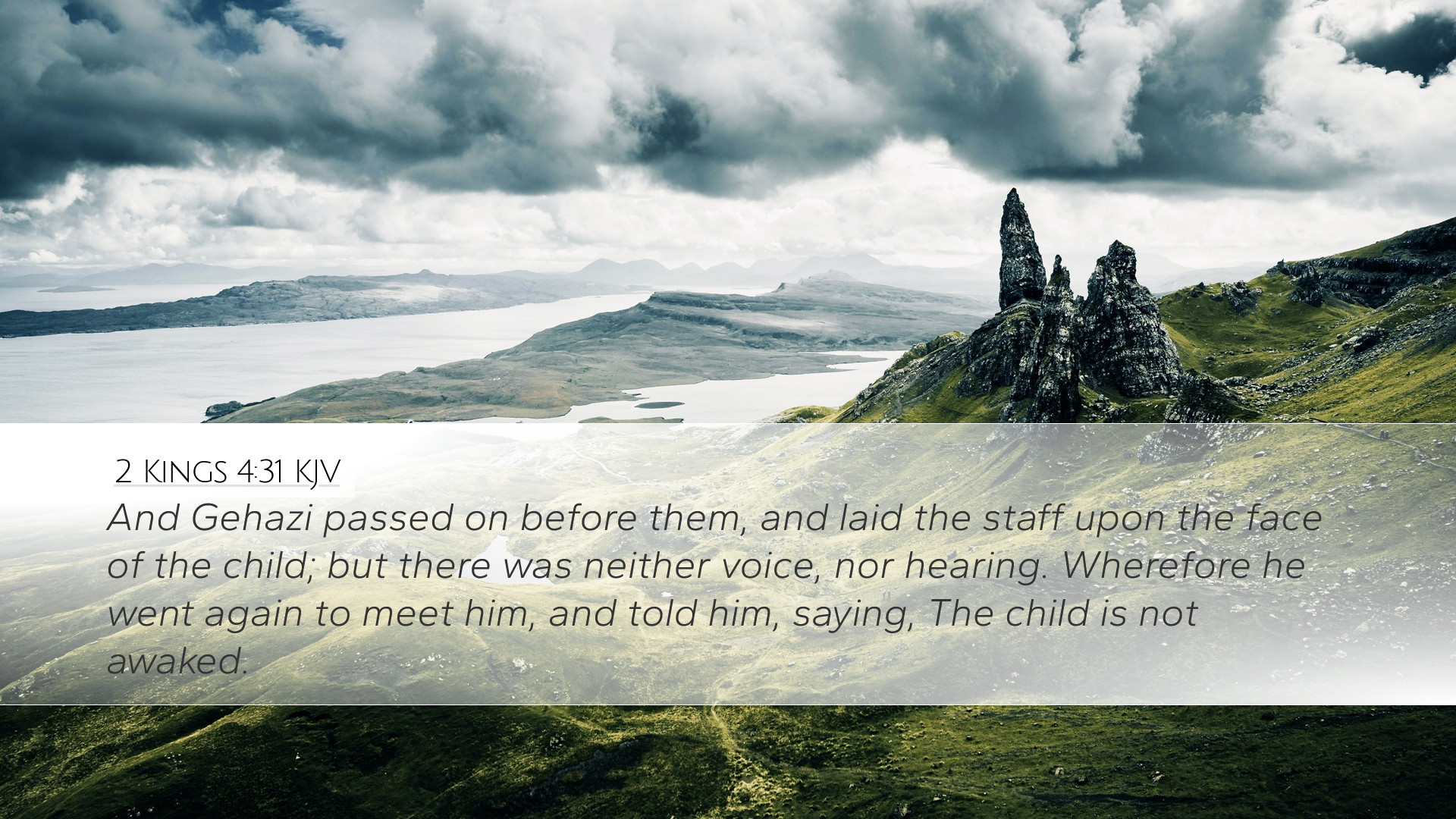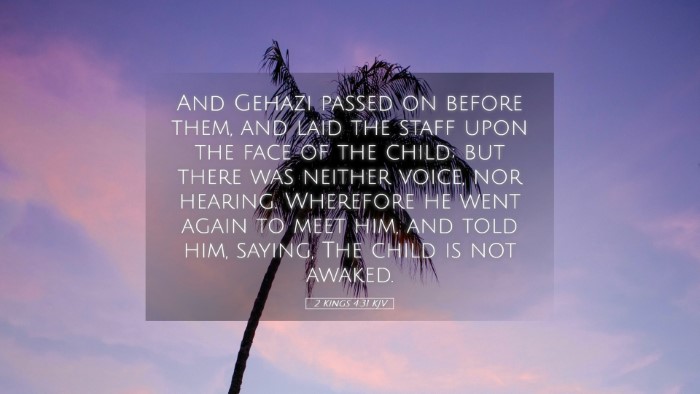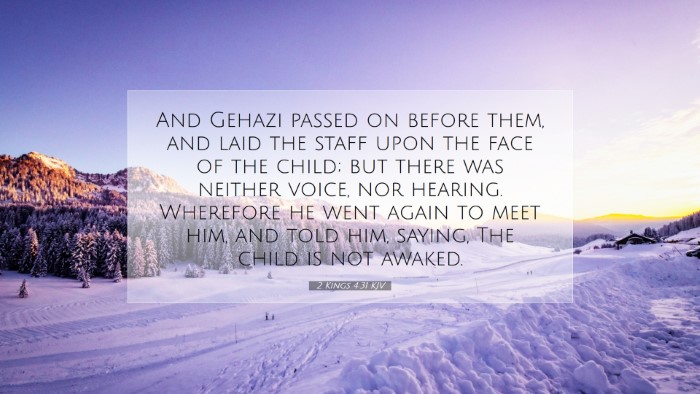Commentary on 2 Kings 4:31
Text of the Verse: "And Gehazi passed on before them, and laid the staff upon the face of the child; but there was neither voice, nor hearing. Wherefore he went again to meet him, and told him, saying, The child is not awaked."
Introduction
2 Kings 4:31 presents a significant moment in the narrative of Elisha, the prophet of God. It reveals the tension between human limitations and divine power. Gehazi, Elisha's servant, is tasked with performing a miracle through the laying of the staff on the child, yet his efforts result in failure. This passage invites deeper reflection on themes of expectation, authority, and divine intervention.
Contextual Background
Understanding the context of this verse is crucial. In the preceding verses, we see the Shunammite woman, whose son has died, seeking out Elisha for help. This highlights the desperation and faith of the mother, who believes that the prophet can restore life. Gehazi's role is significant as he acts on behalf of Elisha, symbolizing the transfer of prophetic authority.
Insights from Public Domain Commentaries
Matthew Henry's Commentary
Matthew Henry emphasizes the theme of the servant's impotence in the face of a dire situation. He notes that Gehazi's actions—laying the staff upon the child's face—were well-intentioned but ultimately ineffective. This shows us that mechanical means, even when they are associated with divine power, cannot bring about a miracle without the presence of the Lord. Henry suggests that this serves as a powerful metaphor for the inadequacy of human efforts in spiritual matters. He states:
"The staff symbolizes the instrument of power and authority; however, it is the Word of God that brings life, not human attempts."
Albert Barnes' Commentary
Albert Barnes provides a historical and theological lens to view this narrative. He notes that Gehazi's failure illustrates a crucial lesson in the nature of prophetic ministry and personal faith. Barnes argues that the staff represented Elisha’s authority; yet, without the prophet himself or his explicit involvement, it was powerless. He remarks:
"The miracle of resurrection requires the living word of the prophet, and not merely his passive symbol."
Further, Barnes highlights the importance of recognizing that some situations require direct divine intervention, which cannot be substituted with symbols or rituals.
Adam Clarke's Commentary
Adam Clarke offers a more detailed exploration of the character of Gehazi, focusing on his role as a servant and the implications of his actions. Clarke insists that Gehazi represents the precarious place of an intermediary in spiritual matters. He explains:
"No matter how skilled or familiar one is with the work of God, without the anointing or presence of God, all efforts are in vain."
Moreover, Clarke notes the emotional weight of this passage for the Shunammite mother, who is anxiously awaiting news of her child, and reflects on the depth of despair felt when hope is met with silence. He adds that Gehazi's report of 'neither voice, nor hearing' symbolizes spiritual deadness, highlighting the urgency of divine action.
Thematic Exploration
Faith and Doubt
This verse underscores the struggle between faith in God's power and the reality of seemingly insurmountable circumstances. The Shunammite woman’s faith contrasts sharply with Gehazi's failure, serving as a reminder that faith must be anchored in God, not merely in the tools available to us.
Human Agency versus Divine Authority
Gehazi's actions provoke a discussion about the relationship between human agency and divine authority. Gehazi serves as a reminder that human efforts, even when intended to honor God, can lead to disappointment if God's presence and power are not actively engaged. It raises the critical question for ministers and leaders: Are we relying on our strategies or actively seeking God’s presence in our ministries?
The Importance of Divine Presence
Ultimately, this passage points to the necessity of God’s direct involvement in miraculous events. Gehazi's attempt reinforces that the mere presence of a prophet's staff cannot replicate the transformative action of God. Thus, it invites pastors and theologians to approach ministry with a profound awareness of their dependence on God’s sovereign action.
Conclusion
2 Kings 4:31 challenges believers to reflect on the nature of faith, the sufficiency of divine authority, and the impotence of human means without divine intervention. It reminds us that while we serve in various capacities, it is God who ultimately revives and restores. The insights from Matthew Henry, Albert Barnes, and Adam Clarke enrich our understanding of this verse by emphasizing the necessity of God’s presence and action in the face of human limitations.
Reflection for Today
As we contemplate this verse, let us consider how we approach situations in our lives that seem hopeless. Are we relying solely on our abilities, or are we seeking God’s presence actively? Let this passage inspire us to cultivate a deeper reliance on the Lord, recognizing that through Him, even the dead can rise again.


